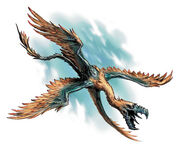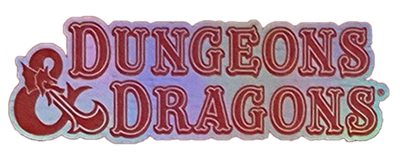Dracomortis (talk | contribs) (Created page) |
Dracomortis (talk | contribs) (Added flavor. Lots and lots of flavor.) |
||
| Line 6: | Line 6: | ||
[[Image:Arrowhawk.jpg|thumb|An arrowhawk's unusual biology is well suited to life on the wing.]] |
[[Image:Arrowhawk.jpg|thumb|An arrowhawk's unusual biology is well suited to life on the wing.]] |
||
| + | |||
| + | Arrowhawks are unusual avian creatures native to the [[4e Index (4e Other)#Elemental Chaos|Elemental Chaos]], though they are occasionally found elsewhere. They possess long, slender bodies; a good half of their length comes from their tail. An arrowhawk's plumage is almost pure white when it first hatches, but most turn tan or light gray as they grow older. Some of its feathers, particularly along the front of the wings and the top of the tail, may possess a blue or purple tint. Its body is almost perfectly symmetrical along a horizontal axis - it possesses two pairs of wings, two pairs of eyes (one above and one below its beak), and even two tongues. Arrowhawks spend their entire lives in flight from the moment they're born. Like certain species of aquatic animals that continually swim, an arrowhawk's brain is split into two distinctive parts. When the arrowhawk grows tired, half of its brain rests while the other half continues to function normally, allowing the creature to effectively "sleep" while still awake. This unusual adaptation means that the arrowhawk is almost always alert, allowing it to survive in a hostile environment where one mistake often leads to death. |
||
| + | |||
| + | Arrowhawks are highly intelligent creatures - an adult is roughly as smart as a human - but seem to behave entirely like animals. They have no culture, no language, and no collective organization, although they seem capable of learning such concepts relatively quickly if taught by an outsider. Why such intelligent creatures have not evolved such things is unknown, but it's speculated that their elemental nature may be responsible. Unlike mundane birds, arrowhawks do not commonly form flocks. Except during mating seasons, most arrowhawks travel alone or with one or two other members of its species. This behavior is thought to prevent competition over food and water, as such commodities can be hard to find in the swirling maelstrom that these creatures call home. When two arrowhawks do meet to mate, they typically produce a clutch of 2-8 eggs (arrowhawk eggs are naturally buoyant, floating in place unless moved by an air current or other force). The male stays with the female only until the eggs are laid, at which point it leaves. The eggs require little assistance until they hatch, so the female leaves them largely untouched, moving them only if they are removed from the nest. Once they hatch, the young arrowhawks remain with their mother for several years until they are adults, then set off on their own. |
||
| + | |||
| + | An adult arrowhawk is around 10 feet in length with a wingspan of about 15 feet. Most specimens weigh no more than 100 pounds. Despite their intelligence, arrowhawks do not speak and do not normally know any languages, unless they have been specifically taught by another creature. |
||
== Arrowhawk Hatchling == |
== Arrowhawk Hatchling == |
||
Revision as of 03:01, 5 November 2009
| Dracomortis (talk) | |
|---|---|
| Date Created: | October 27, 2009 |
| Status: | Under construction |
| Editing: | Please feel free to edit constructively! |

An arrowhawk's unusual biology is well suited to life on the wing.
Arrowhawks are unusual avian creatures native to the Elemental Chaos, though they are occasionally found elsewhere. They possess long, slender bodies; a good half of their length comes from their tail. An arrowhawk's plumage is almost pure white when it first hatches, but most turn tan or light gray as they grow older. Some of its feathers, particularly along the front of the wings and the top of the tail, may possess a blue or purple tint. Its body is almost perfectly symmetrical along a horizontal axis - it possesses two pairs of wings, two pairs of eyes (one above and one below its beak), and even two tongues. Arrowhawks spend their entire lives in flight from the moment they're born. Like certain species of aquatic animals that continually swim, an arrowhawk's brain is split into two distinctive parts. When the arrowhawk grows tired, half of its brain rests while the other half continues to function normally, allowing the creature to effectively "sleep" while still awake. This unusual adaptation means that the arrowhawk is almost always alert, allowing it to survive in a hostile environment where one mistake often leads to death.
Arrowhawks are highly intelligent creatures - an adult is roughly as smart as a human - but seem to behave entirely like animals. They have no culture, no language, and no collective organization, although they seem capable of learning such concepts relatively quickly if taught by an outsider. Why such intelligent creatures have not evolved such things is unknown, but it's speculated that their elemental nature may be responsible. Unlike mundane birds, arrowhawks do not commonly form flocks. Except during mating seasons, most arrowhawks travel alone or with one or two other members of its species. This behavior is thought to prevent competition over food and water, as such commodities can be hard to find in the swirling maelstrom that these creatures call home. When two arrowhawks do meet to mate, they typically produce a clutch of 2-8 eggs (arrowhawk eggs are naturally buoyant, floating in place unless moved by an air current or other force). The male stays with the female only until the eggs are laid, at which point it leaves. The eggs require little assistance until they hatch, so the female leaves them largely untouched, moving them only if they are removed from the nest. Once they hatch, the young arrowhawks remain with their mother for several years until they are adults, then set off on their own.
An adult arrowhawk is around 10 feet in length with a wingspan of about 15 feet. Most specimens weigh no more than 100 pounds. Despite their intelligence, arrowhawks do not speak and do not normally know any languages, unless they have been specifically taught by another creature.
Arrowhawk Hatchling
A hatchling is an arrowhawk up to 3 years old. During this time the creatures are small and highly susceptible to predation, though they are by no means defenseless. Hatchlings stay with their parents at all times, leaving only once they have reached maturity and are ready to fend for themselves.
Arrowhawk Hatchling Level 3 Artillery
| |||
|---|---|---|---|
Small elemental magical beast (air) XP 150
| |||
| Initiative +7 | Senses Perception +3; darkvision | ||
| HP 38; Bloodied 19 | |||
| AC 15; Fortitude 15, Reflex 18, Will 15 | |||
| Resist 5 lightning | |||
| Speed fly 10 (hover) | |||
| +10 vs. AC; 1d6 + 3 damage. | |||
| Ranged 10; +8 vs. Reflex; 1d10 + 3 lightning damage. | |||
| Alignment Unaligned | Languages — | ||
| Skills — | |||
| Str 14 (+3) | Dex 20 (+6) | Wis 15 (+3) | |
| Con 14 (+3) | Int 10 (+1) | Cha 11 (+1) | |
Arrowhawk Hatchling Tactics
Hatchlings hide behind their parents during combat, firing off electricity rays and relying on their speed to stay out of harm's way. If their parent is slain, the hatchlings will attempt to flee.
Arrowhawk Lore
A character knows the following information with a successful check.
- DC 15:
- DC 20:
- DC 25:
Encounter Groups
Level Encounter (XP )
Back to Main Page → Homebrew → Creatures → Homebrew Creatures.
Back to Main Page → Homebrew → Creatures → By Level → Level 3
[[Category:]]
